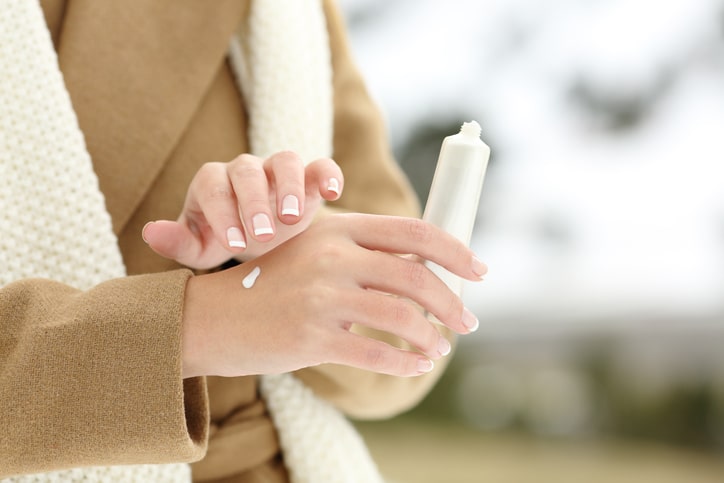Our intense winters bring frigid temperatures and often times undesirable dry skin. Next to other common winter ailments, like the cold and flu, dry skin may seem like a minor annoyance or simply an aesthetic problem. However, there are potentially significant consequences from chronic or severe dry skin.
What Causes Dry Skin in the Winter?
The short answer is cold air. This concept may seem counter-intuitive. After all, wouldn’t you associate a hot desert with dryness? But cold air holds little moisture in contrast to warm air, which can become quite humid. In other words, cold air is usually dry, and this lack of humidity can quickly dry out your skin.
In warmer months, rain can reintroduce water vapor to the air and bring back moisture. However, during the Connecticut winter, any precipitation is almost always in the form of ice or snow. These forms of precipitation trap moisture, providing little relief for dry skin.
Hot baths and showers are another cause of dry skin during cold weather. It can feel pleasant and soothing to take a relaxing soak in hot water after a long, cold day, but this is not a great practice for your skin. Hot water dries out your skin. Plus, hot water encourages your pores to open, making you more susceptible to the cold when you venture outside again.
Why is Dry Skin a Problem?
Cases of dry skin are usually self-limiting, meaning the problem typically gets better on its own. A day or two of warmer weather is often all you need for your dry skin problem to disappear. However, skin that is chronically or severely dry can lead to difficulties.
Dry skin is usually itchy, so you may feel the urge to scratch it. Scratching combined with chronic dryness can result in atopic dermatitis, better known as eczema. This condition is characterized by long-lasting patches of red, scaly dry skin.
Also, scratching at dry skin can leave you open to infections such as dermatitis and cellulitis. Fungal infections can also take hold. If your skin is severely dry, it may even crack or split on its own without scratching. Cracks in the skin of the feet are a particular problem for diabetics, who may have reduced sensation in their feet and be unable to feel breaks in their skin.
What Can I Do to Prevent Winter Dry Skin?
The best thing you can do to prevent dry skin in cold weather is to use a good moisturizing lotion. The lotion you choose does not have to be expensive, and you should ask your primary care physician (PCP) if you need a product recommendation. Apply the lotion before going outdoors and as many times throughout the day as needed.
Also, resist the urge to scratch dry skin, no matter how itchy. If needed, use over-the-counter anti-itch cream, or ask your PCP for something to reduce itchiness. Finally, avoid very hot showers and baths. Instead, use warm water. A warm shower can still be pleasant without overly drying your skin. Always be sure to apply more moisturizing lotion after your bath or shower and before you dress.
When Should I See a Doctor for Dry Skin?
You can usually manage dry skin on your own, but there are times when you should see your doctor as soon as possible. Any sign of infection should be addressed immediately. These signs include skin that is:
- – Swollen
- – Draining or weeping fluid
- – Pus-filled
- – Painful
- – Bleeding
- – Persistently red
Also, any seriously dry skin that does not improve after a few days of moisturizing lotion application probably needs professional medical care. If you have a pre-existing skin condition, such as psoriasis or eczema, you may require prescription lotions from your doctor to treat your dry skin during the colder months.
Your primary care provider’s office is an excellent place to begin when you need help with dry skin or any skin symptoms. They can help diagnose your condition, recommend medications and non-pharmaceutical measures, and provide advice about avoiding skin dryness. If needed, your PCP can also refer you to a specialist like a dermatologist or an allergist.
Looking For a Dermatologist in Connecticut?
Now Accepting New Patients in Orange, CT – Specializing in Medical Dermatology and Cosmetic Dermatology
To schedule an appointment, please call 203-865-6143 or request an appointment online.








